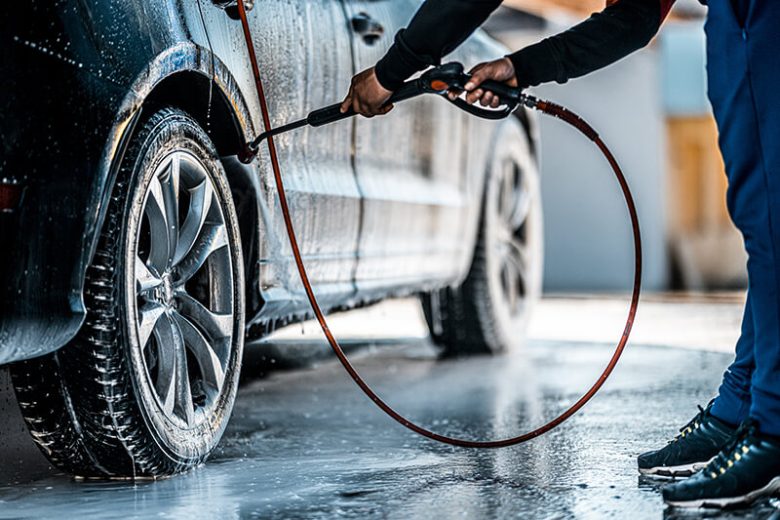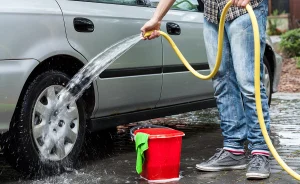The at-home car wash method, using soap and water, and even automatic car washes can generate a lot of wastewater that, without being managed properly, can cause adverse environmental concerns such as: contaminating soil, creating runoff that may find its way into a storm drain, or even damage water bodies.
In this case, working around these cons can be accomplished, such as utilizing an environmentally safe car wash. The following tips will aid you for this purpose:
Waterless Car Wash
A lot of passionate vehicular owners together with their detailers understand the importance of making their methods eco-sustainable. However, these sprays work by breaking down dirt molecules into smaller pieces that can easily be wiped away with the help of microfiber towels.
They also do contain cleaning and lubricating detergents which make the work easier. When looking for eco-friendly options, the emphasis should always be on being effective. An ideal one should contain pH balanced guarantees without harming the paint, offers some form of wax sealant or sealants, and has protective capabilities as well.
Begin with a spotless designated area in the vehicle and apply the solution generously to lock in the dirt from the surface of the paint. Then, use premium microfiber towels to avoid scratching the surface and have one on standby for buffing and changing frequently as required. Chemical Guys EcoSmart-RU and Meguiar’s Ultimate Waterless Car Wash products work well with no hoses needed, and care for the environment with biodegradable substances and no harmful chemical emissions enabling effortless cleaning of the car for the customer.
Biodegradable Soap
Standard soaps for washing cars contain very harmful substances that damage the environment. The Eco-friendly car wash soaps are a biodegradable substitute that is safe to use in water streams and does not pose any threats to the flora and fauna of the country.
Substitute non polluting products can be purchased at any hardware store or make an eco-friendly mixture yourself from Castile soap, white vinegar and baking soda. Baking soda helps lift dirt with scrubbing as a natural abrasive and vinegar dissolves grease and dirt fast.Essential oils can be added to improve the scents.
Whether or not you crafted your crème de rinse or sourced it from a store, ensure to dispose of any residual soapy water far from hydric bodies. When washing away dirt and grim while camping, try and place the rinse water into a grey water drain. At home, dumping soapy water into the sink or toilet is preferable as both options mitigate the negative impact on the environment.
Vinegar
For some time, vinegar has been a staple item in households, but in recent weeks its popularity has grown exponentially. It feels like I can’t go by a checkout magazine without bumping into one of another hundred all proclaiming the wonders and beauty of it, apple cider vinegar in particular. Not only does it promise to treat diabetes and jock itch and alleviating constipation, but it can also be used as an industrial cleaner as well as a cooking and preservative ingredient.
As an all-purpose cleaner, vinegar makes for an efficient all-round car care corp product that can do pretty much everything anything from removing stickers and decals off many surfaces to wiping windshields during cold confrontational winter weather wipe-downs. Pouring some baking soda into your solution of vinegar and water creates a powerful tire dunk cleaner.
When cleaning your vehicle with biodegradable soap or vinegar, remember to only rinse several times instead of for prolong periods as it will save water! Furthermore, whenever possible, try to wash over grass or soil instead of concrete. Additionally, dirty water from the buckets should be poured directly into the toilet or the sink instead of the drains to minimize pollution.
High-Pressure Nozzles
Buy self-service car wash systems with high-pressure nozzles that allow the customers to regulate the quantity of water that is used. Nozzles with pistol grips and an on/off control are convenient for consumers because they can easily turn off flow while soaping or rinsing the vehicle, or washing sensitive areas like the finishes of cars without damaging them.
Eco-friendly car washing solutions utilize sophisticated filtration and recycling systems to wash their operational environmental footprints. These systems measure water and soap usage accurately by dispensing them while an effective computation system does the environmental waste for the setting, thus limiting the waste while putting accurate measures to the soap and water it does use, purifies and recycles it for reuse.
The untreated soap and oil runoff from at-home car washes contributes to the polution of the local water bodies, ultimately putting a strain on the freshwater availability. Most commercial car washes employ water reclamation vehicle washing facilities that have a lower negative impact on the environment. Most of these also use biodegradable cleaning detergents to increase their eco-friendly stance.
Bucket and Sponge
Using dishwashing soap instead of a professional car wash may seem economical for car owners, but it can lead to damage and loss of your car’s clear coat and paint finish. In case you wish to DIY your car wash with dish soap, it is best to follow up with a wax coating to ensure best results. Detergent can be applied where necessary, but works best when used sparingly; melamine sponges will work, but requires some scrubbing and can potentially lead to rough surface damage abrasive surface material.
In the case you decide to wash your care with a bucket and sponge, be sure to select non-toxic biodegradable washing products that do not contain phosphates, fragrance, chlorine, or any petroleum-based chemicals. Rinsing your car while parked on a grass surface instead of pavement allows for more absorption of the rinse water and helps avoid contaminating nearby storm drains or rivers. When you have finished washing your car, instead of disposing the dirty water down the street or driveway, bring your buckets indoors and pour the water down a toilet or sink instead.


